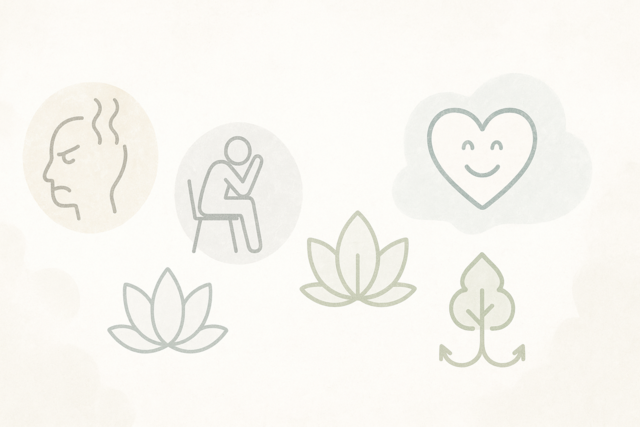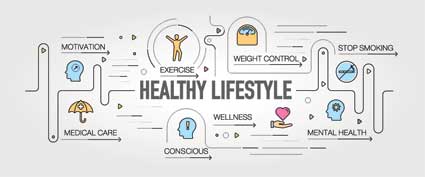Relaxation and Serious Illness
-
What If I'm Already Sick?
-
Heart disease
-
Diabetes
-
Cancer
-
Accepting Stress In Our Lives
-
Appreciate Life, No Matter What
What If I'm Already Sick?
Most heart attack patients are initially delighted that they survived the attack, but then they are faced with the difficult questions of whether their lifestyle or their stress level led to their situation. For many of these patients, depression follows the miraculous recovery.
Diabetes is another situation where people are somewhat happy to still be alive, but know that somehow they were responsible for their situation. Where is the happiness or relaxation in that?
Then we talk to cancer patients and look at studies about stress and cancer. Did their stress levels lead to their cancer?
Stop those questions right now!
For any situation, one can look for a study that either supports or refutes it. But how does that help the one who is recovering, or who is still facing a diagnosis that means their life has changed permanently?
The Art of Relaxation has the power to change the lives of millions of people, but for those who are facing a life-threatening illness, learning the Art of Relaxation can mean a difference in the quality of life for their remaining months or years.
We all know someone who has faced a life-threatening illness. Most of us would agree that we didn't know how to face them or how to help them through it. The first thing to remember is that it doesn't matter if stress is or is not responsible for their/your illness. Even if stress had some role in the development of the illness, how does that help you now?
It doesn't.
What can help, however, is to know that you have a choice in how you respond to this body that has changed in ways you never imagined. You might wish you could trade it in on a new model, and your friends and family will jokingly go along with you; but everyone knows that in the end, this is the one you're running with. How you choose to use it now will determine the course of your life.
Before we explore this topic further, we need to be very clear on something: "Putting on a happy face" is not the answer. There will be days when someone who is facing a life-threatening illness wants to do nothing more than cry, scream, or just feel depressed. Putting on a happy face doesn't work. A false expression of emotions helps no one, not physically, nor psychologically. It is normal to feel depressed, or distressed, or even hopeless at times.
A study has been done where the suppression or repression of emotions was evaluated. By not sharing your feelings, or not letting others see how you're feeling, you're doing no one any good. The study indicates that there is a negative influence on survival when this is done. People do better, and feel better, when they are able to be open and honest about how they feel.
Heart Disease
Because heart disease often arrives without much notice, most patients are taken by surprise when they find themselves facing medical personnel who are saving their lives. At first they are grateful. Then begins the self-destructive process of blaming themselves for their eating and exercise habits.
Self-blame and self-pity doesn't help. Stress comes from trying or wanting to change something that is outside your control. Depression is a fairly common occurrence for heart patients, because they begin blaming themselves for their situation. The occurrence of depression for heart patients is nearly the same as those who face cancer.
Having heart disease changes how people look at themselves. Prior to their heart attack, they lived active and exciting lives. After the heart attack, all they can see is that somehow they have failed themselves. Studies have shown that heart attack victims who do not go through a rehabilitation process are five to six times more likely to have another heart attack within a couple of years. For those who do go through rehabilitation, those who do it alone are three times more likely to die from their next cardiac event. This means they need someone with them.
After you've had a heart attack, it's hard to think about life before the heart attack. All you think about is whether each thing you feel is the advent of the next cardiac event, which is nearly guaranteed. Stress, most definitely, has a role in heart disease; it's been proven. But once you've had a cardiac event, a heart attack, or stroke, focusing on the stress is not the answer. Learning to manage stress and leading a more relaxing life is the answer. Unfortunately, most cardiac patients don't know how to add more relaxation and reduce the stress in their lives.
Because diabetes occurs late in life for many people, specifically Type 2 diabetes, those who suffer from it feel that they are responsible for their predicament. Some of them feel that they deserve to have trouble with their eyes, an inability to feel their extremities, and everything else that comes along with a diabetes diagnosis. Even if this were true, what good does it do?
To complicate matters, depression and Type 2 diabetes seem to be inextricably linked and yet there no definitive evidence that depression causes diabetes, or that diabetes causes depression. What we do know is that a diabetic with depression is more likely to not stick to treatment plans that include exercise, eating plans, and medication. The good news is that depression is treatable, and that people with depression and diabetes have a good experience with talking about their situation.
You've learned that it is OK to acknowledge your thoughts and feelings. To discover what you're feeling and why can be helpful. You've also learned that there are a number of interventions in The Art of Relaxation that can improve the medical condition of people with diabetes.
Instead of seeing themselves as invalids, Type 2 diabetics can see themselves as productive members of society who have needs and feelings that are as valid as anyone else. Having an illness is an aspect of being human. It doesn't have to define who you are.
Wishing for a certain standard of living doesn't make it so. Acknowledging your feelings about your situation helps you to accept and even become aware of ways you can work with your illness rather than fight it.
Cancer
Something that used to be a death sentence, cancer has been given a slight reprieve over the years. However, people suffering from cancer, or who love someone who has had a cancer diagnosis, really want to help; so they look for all possible reasons for the cancer.
Can stress have a role in someone developing cancer.
Possibly. Certainly some studies even suggest it.
It doesn't matter if stress caused your cancer! What matters is that you are dealing with a grave illness, and you want to know how to handle it. Will reducing existing stress in your life and incorporating relaxation techniques help you?
The short answer is, "Yes!"
Will it cure you?
No one knows.
What learning about The Art of Relaxation will do for you is to help you to experience and appreciate the moments and days you have left to live. That's all anyone can promise.
The idea that there is only one way to cope with stress, or that there is only one style of coping is a myth. What you will learn in this section is that the best coping style is a problem-based coping style, which means you do what you need to in order to solve the current problem.
If you cannot solve the problem, then you somehow have to figure out how to let it go. You will deal with the emotions that come up, but you acknowledge that you cannot control the situation.
You've already learned that you cannot control everything there is to control about the world. In fact, you have already learned that you can accept the world as it is, and just allow things to "be" without attachment. Trying to relax and be calm usually works against you. Working to simply accept what is seems hard, but leads you to an area of reduced stress. This might mean you have to "unschedule" your appointment days. Rather than trying to get a lot of things accomplished, you just accept what happens and be content with it.
Choosing to respond mindfully to stress means that we can change how stress affects us, immediately!
As soon as we notice that we are facing stress (perhaps we are going to a doctor's appointment or are waiting for a treatment procedure) we make ourselves aware of our thoughts and feelings. Is there a threat that we can do something about? By noticing, or being mindful of our situation we can begin the relaxation response rather than the stress response. As you know, the stress response is to increase our muscle tension, our blood pressure, and our rate of breathing. By choosing the relaxation response instead, we can decrease our level of arousal, lower our heart rate and blood pressure, sleep better, have fewer headaches, backaches, and stomachaches and less overall anxiety.
As we recognize our response to stress, we may want to incorporate other adaptive behaviors, such as yoga, meditation, sound therapy or aromatherapy in order to help us to cope with our stress response. By exploring such options we can often find other options that allow us to recover faster and more completely from a procedure, which will improve our health, improve our mood, and restore both our physical and psychological equilibrium.
What this process does is it teaches to be less reactive and more responsive to stress. To notice stress, is to minimize it. While stress is responsible for our "fight-or-flight" response, it is both a physical and mental event. In order to control and manage stress, we must first notice it and then determine how to respond to it.
The first step is to simply notice our reaction to stress, then we immediately apply some "mindfulness" techniques. By noticing our reaction to stress, we almost immediately know to respond differently.
What if you don't!
That's OK too! Because the interesting thing is that you noticed that you didn't respond differently. Just by noticing, you're changing the course of your behavior. Then, you are also learning to accept things you can't change. Some things just "are."
As you notice things, you will also begin to notice how you may jump to conclusions or "globalize" your thinking, meaning that if something happened to you once, it will always happen to you now "no matter what!"
By pausing to notice your response to stressful times, you can change your beliefs and recognize that things are not always as you thought they would be. Sometimes there is great relief in recognizing that sometimes thoughts are just thoughts. Just because you "think" something, doesn't make it real!
Appreciate Life No Matter What
For those who are facing a life-threatening illness, joining a support group can be immensely helpful. Why? It reminds you that you are not alone. There are others who are facing the same thing you are facing. Talking to people who truly understand can have benefits far beyond your imagining.
Once you share your experiences with people who understand, you may see that your life still has a great deal of meaning. A diagnosis is simply that, a diagnosis. It doesn't mean that you suddenly cease to exist.
Everyone in this world has the right to learn to live a life of relaxation.
Facing your challenges gives you the opportunity to live your life to the fullest. Recognizing your response to stressful situations allows you to either accept your response, or to change your response.
Notice your life.
Notice your responses to situations.
Recognize when you can change something, and when you cannot. When you can change something and you want to, do so. When you cannot change something, let it go.
Having a life-threatening illness does not negate you as a person. You have as much right to life as the next person. By experiencing your life day by day, minute by minute, you are giving yourself the opportunity to really live. Every breath you take is an opportunity to live. Don't waste it.



























